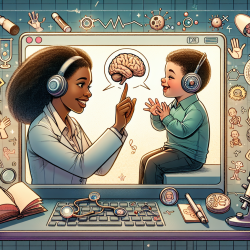Introduction
In the realm of online therapy, data-driven decision-making is paramount to achieving optimal outcomes. A recent study titled Predicting the Effectiveness of a Mindfulness Virtual Community Intervention for University Students: Machine Learning Model provides valuable insights into how machine learning can enhance the effectiveness of online mindfulness interventions. This blog will delve into the study's findings and explore how these insights can be applied to improve online therapy services, particularly for children.
The Study's Core Findings
The study employed machine learning models to predict the effectiveness of a Mindfulness Virtual Community (MVC) intervention aimed at reducing symptoms of depression, anxiety, and stress among university students. The intervention's success was measured using the Patient Health Questionnaire-9 (PHQ-9), Beck Anxiety Inventory (BAI), and Perceived Stress Scale (PSS).
Key findings include:
- Gradient boosting achieved the highest accuracy for predicting reductions in PHQ-9 and PSS scores, with an AUC of 0.85 and 1, respectively.
- Random forest was most effective for predicting BAI reductions, with an AUC of 0.93.
- Exposure to mindfulness videos was the most significant predictor of intervention success, followed by the number of working hours per week.
Implications for Online Therapy Services
The study's insights have significant implications for online therapy services, especially for children. By leveraging machine learning models, therapists can predict the effectiveness of interventions and tailor them to individual needs. Here are some practical applications:
- Personalized Interventions: By analyzing sociodemographic and self-reported data, therapists can identify which children are most likely to benefit from mindfulness interventions and adjust their approach accordingly.
- Scalability: The study demonstrates that exposure to mindfulness videos alone can significantly impact mental health outcomes. This finding suggests that online therapy services can be scaled efficiently without additional human resources, making them accessible to a broader audience.
- Cost-Effectiveness: Machine learning models can help identify the most cost-effective interventions, ensuring that resources are allocated efficiently to maximize therapeutic outcomes.
Encouraging Further Research
While the study provides a robust foundation, further research is essential to explore the applicability of these findings to different populations, including children. Practitioners are encouraged to investigate how machine learning models can be integrated into their practice to enhance therapy outcomes.
Conclusion
By embracing data-driven approaches and leveraging the power of machine learning, online therapy services can be significantly enhanced. The insights from this study offer a pathway to more personalized, scalable, and cost-effective interventions, ultimately improving mental health outcomes for children.
To read the original research paper, please follow this link: Predicting the Effectiveness of a Mindfulness Virtual Community Intervention for University Students: Machine Learning Model.










